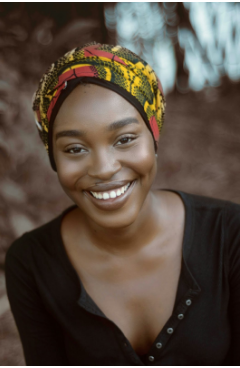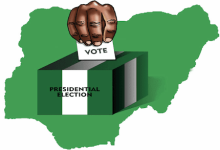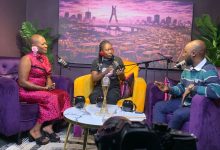
|
Getting your Trinity Audio player ready...
|
You know that moment at a poetry reading when the poet reads a line, and it hits you at the right spot in your chest, such that you begin to snap your fingers and scream: “Yes, yes, yes”? I felt that way a few days back while leisurely scrolling through my Twitter feed and coming across a tweet that strongly resonated with me. I snapped my fingers; I screamed. It was something along the lines of “how can you claim to fight for human rights and oppose feminism since feminism in itself is human rights?”
A friend once asked me on her podcast what feminism meant to me, in my own words. Common sense and basic human decency, I told her. Extend all the rights and privileges accorded to men to women and don’t deprive women of their basic human rights because of their gender.
It is not shocking that in a patriarchal society like Nigeria, with conservative moral standards and religions, the Feminist Movement is largely frowned upon. This naturally encourages assumptions and misconceptions about people who take on the title. Before feminism became a widely known topic in Nigeria, feminists like Chimamanda Ngozi Adichie, who has been very vocal about her feminist ideals since the early 2000s, received and still receive backlash from society.
It was in actively becoming involved with the feminist movement that I began to see the many misconceptions people had about it. Using everyday experiences, on both social media and in real life, the following are common misconceptions about feminism that I have observed.
“You are in pain sister, please heal”
I have read and heard this as a reply to feminist views many times than I can remember. There is the notion that feminists are bitter, ugly, angry women who have been heartbroken by lovers in the past and project their pain under the guise of demanding equality.
In 2019, in my village, during one of those big family Christmas celebrations, I got engaged in a conversation with my cousin. I told him that women were equal to men, not in a biological sense, and so they should not be treated as less. He flared up, the veins on his forehead straining, called me a “man-hater” and told me how a man was the head and a woman the neck.
My advice for women who identify as feminists is this: understand that they will be assumed to be bitter, ugly, and angry even when you are visibly the opposite of these. The tactic of using derogatory words to shut up women is not new. Both in recent times and the past, women who do not conform or question the status quo are called ashewo (Nigerian pidgin for prostitute) or witches. The culture of shaming using vile words has been weaponised for centuries to silence women—wear these words boldly and watch their effects crumble to dust.
“Inequality? Come on! It’s the 21st century!”
Or I have a Mother, a daughter, and two sisters, they don’t complain. Unlike the category of people who rain abuses on feminists, calling them bitter, ugly, angry women, this category comprises the supposedly enlightened ones who believe that gender bias doesn’t exist in Nigeria. It is the 21st century, they say, things have changed over time. But I beg to differ.
Girls are still told that the highest form of achievement in life as a woman is acquiring proper culinary skills, finding a husband, and training children as a full-time job. Young women can’t rent houses without being married or at least pretending to be. Women are denied promotions, job opportunities, and when they do get them, their success is questioned. Women and girls are molested, sexually assaulted, and raped, then blamed for letting those things happen to them.
Yet, people are blind to the injustice and bias against women in the 21st century? Beliefs such as this assume that feminists exaggerate injustices against them and encourage the first misconception discussed earlier.
If feminism is human rights, why focus on women alone?”
Feminism and selfishness have somehow become synonyms. Yes, feminism is the equality of all genders. I used to answer the “what is feminism” question with that. But over time, I began to realise that feminism focuses on women, on levelling the playing field for women, women that have been oppressed for centuries.
Daily, women face a system that is rigged against them for being born as girls: sexism, gender pay gaps, voting rights, gender roles designed to hold them down, rape and rape culture. I realised that in equating feminism to human rights on the base level, I was somehow re-enforcing the belief that there was no visible gap in gender equality staring us in the face. So, yes, feminism is a human right and focuses on the unequal treatment of women and girls.
“We are Africans; it is not in our culture.”
In every conversation about demanding gender equality, there is always the category of people who outrightly claim that men at the top and women below is the way our culture dictates. The African (or Nigerian) culture has been known historically to designate specific roles for men and women. Men and boys go out to jobs that are perceived as masculine, while women and girls stay home, cooking and cleaning.
Times have changed, people evolve, and culture has too. Over time, we see that gender roles have been used as tools to oppress women as a group. At a point in the history of the Igbo people, twins were regarded as taboo and killed or thrown away to die. Today, the practice of killing twins is taboo, and twins are now regarded as a double blessing in a family. Culture is susceptible to change because people make culture, not vice versa.
“If the full humanity of women is not our culture, then we should and must make it our culture.”
Chimamanda Ngozi Adichie, We Should All Be Feminists.
“Feminist, but you are a *insert flaw* “
There is the perception that to be a feminist, one must somehow rid oneself of everything bad and evil, that they must be perfect and incapable of bad deeds. “You’re a feminist, but you killed somebody.” Feminism is not synonymous with sainthood. Feminists are humans; they have flaws, virtues, and vices. They can be thieves, liars, gossips, murderers. They would simply be thieves, liars, gossips, murderers who believe women should have equal rights and privileges like men.
These perceptions about feminists and feminism are deeply rooted and subsist because people would rather stick to the status quo than question it or think logically.
I think people also lack empathy. You need empathy to understand or even feel what it is like to be on the receiving end of oppression. A few months into the pandemic, the world witnessed the Black Lives Matter (BLM) protest by the black community in the United States. Nigerians who have never been to the US put up fist emojis and hashtags indicating alliance on their social media pages. That is empathy! Although some may never have experienced racism, they put themselves in the shoes of black Americans in the United States; they imagined what it would feel like to be there and empathised. This, too, can work in understanding feminism. We need to have empathy for women who just want to have rights and privileges. Women want to be treated as equals, not as second-class citizens in their country.
This article was first published on afritondon.com






